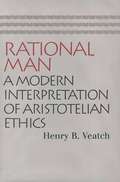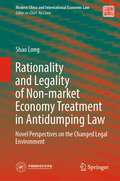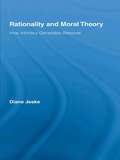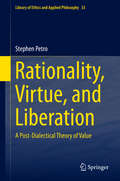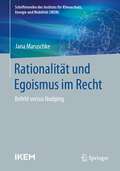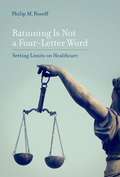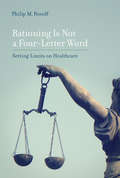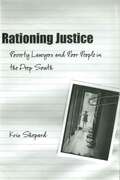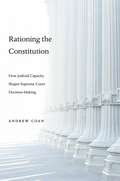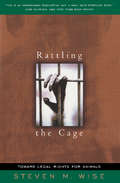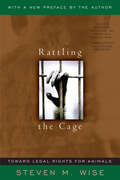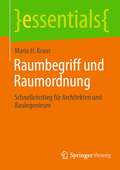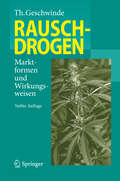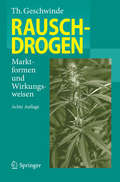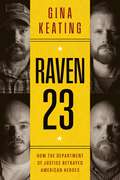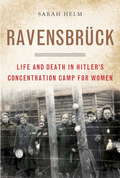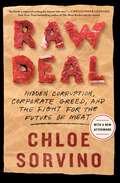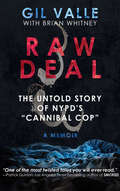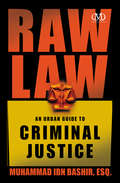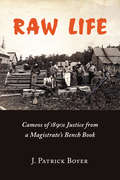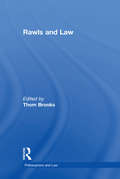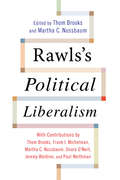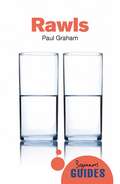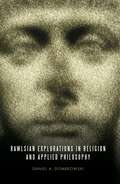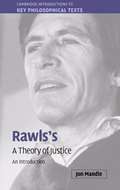- Table View
- List View
Rational Man: A Modern Interpretation Of Aristotelian Ethics
by Douglas B. Rasmussen Henry Babcock VeatchForty years after its original publication, Liberty Fund brings back to print Henry Veatch's path-breaking popular presentation of virtue ethics. This modern interpretation of Aristotelian ethics is a natural for undergraduate philosophy courses. It is also an engaging work for the expert and the beginner alike, offering a middle ground between existential and analytic ethics. Veatch argues for the existence of ethical knowledge, and he reasons that this knowledge is grounded in human nature. Yet he contends that the moral life is not merely one of following rules or recipes, nor is human well-being something simple. Rather, the moral life, which Veatch calls #147;rational or intelligent living," is the life of practical wisdom where individual judgment of the particular and the contingent is paramount. Veatch's Rational Man offers a pluralistic understanding of human well-being without lapsing into moral relativism. For those interested in morality and liberty, Rational Man offers fertile ground for developing an account of free and responsible persons. It has profoundly influenced the work of Den Uyl, Campbell, Machan, Miller, Mack, and many others. Henry Babcock Veatch (1911#150;1999) was born in Evansville, Indiana, and educated at Harvard. He was recognized as one of the leading neo-Aristotelian philosophers of the twentieth century. Besides Rational Man, he was the author of Intentional Logic; Realism and Nominalism Revisited; Aristotle: A Contemporary Appreciation; and many others.
Rationality and Legality of Non-market Economy Treatment in Antidumping Law: Novel Perspectives on the Changed Legal Environment (Modern China and International Economic Law)
by Shao LongThis book serves as a comprehensive study of and provides rich insight into non-market economy treatment, including its past, present, and estimated future practices and implications. It explores the introduction of the market and non-market economy dichotomy into international trade law. It traces the origin and development of non-market economy treatment against changing international economic and political background. The book examines this treatment in light of the rationale underlying anti-dumping, reflecting its alleged significance of ensuring fair trade. It in particular investigates the varied non-market economy treatment practices responding concerns of China’s rising as a large state-led economy, analyzing the deviation of NME treatment into an all-in trade tool. The book argues against preconceived bias and unilateral protectionism. It highlights the universal existence of government involvement in the market and proposes objective assessment of its impact on fair trade. Final proposition of the book is depoliticizing trade, reforming comprehensively international trade rules to carefully calibrate different values, including promoting fairness and enhancing global social welfare. It envisages a multi-dimension overhaul of international trade rules to rebalance trade interests, rather than roughly labeling an economy to confer different treatment, the practices of which lead to separation and chaos. The book is of particular relevance and interest to economies-in-transition, and among policy makers, academicians and legal practitioners engaged in trade remedies and trade rules reconstruction.
Rationality and Moral Theory: How Intimacy Generates Reasons (Routledge Studies in Ethics and Moral Theory #Vol. 13)
by Diane JeskeThis book provides answers to both normative and metaethical questions in a way that shows the interconnection of both types of questions, and also shows how a complete theory of reasons can be developed by moving back and forth between the two types of questions. It offers an account of the nature of intimate relationships and of the nature of the reasons that intimacy provides, and then uses that account to defend a traditional intuitionist metaethics. The book thus combines attention to the details of the lived moral life – the context in which many of our most pressing moral questions arise, how we deliberate and make moral decisions, the complexities that plague our attempts to know what we ought to do – with theoretical rigor in offering an account of the nature of reasons, how we come to have moral knowledge, and how we can adjudicate between competing positions.
Rationality, Virtue, and Liberation
by Stephen PetroThis book explores the overlooked but vital theoretical relationships between R. M. Hare, Alan Gewirth, and Jürgen Habermas. The author claims their accounts of value, while failing to address classic virtue-theoretical critiques, bear the seeds of a resolution to the ultimate question "What is most valuable?" These dialectical approaches, as claimed, justify a reinterpretation of value and value judgment according to the Carnapian conception of an empirical-linguistic framework or grammar. Through a further synthesis with the work of Philippa Foot and Thomas Magnell, the author shows that "value" would be literally meaningless without four fundamental phenomena which constitute such a framework: Logical Judgment, Conceptual Synthesis, Conceptual Abstraction, and Freedom. As part of the 'grammar of goodness,' the excellence of these phenomena, in a highly concrete way, constitute the essence of the greatest good, as this book explains.
Rationalität und Egoismus im Recht: Befehl versus Nudging (Schriftenreihe des Instituts für Klimaschutz, Energie und Mobilität)
by Jana MaruschkeDieses Buch fragt danach, wie Recht und Rechtsprechung, Staats- und Rechtstheorie sowie moderne Verhaltensökonomie die Rationalität und den Egoismus des Menschen begreifen und wie dies die Wahl staatlicher Steuerungsinstrumente beeinflusst. Das scheinbar neuartige Instrument Nudging wird mit Blick auf Umweltschutzinstrumente, die Regulierung des Tabakrauchens und der Organspende in den öffentlich-rechtlichen Handlungsformenkatalog eingeordnet, wobei verfassungsrechtliche Grenzen diskutiert werden. Zielgruppe sind die an der "Metaebene" des Rechts und der Verhaltenssteuerung interessierten Leserinnen und Leser.
Rationing Is Not a Four-Letter Word
by Philip M. RosoffMost people would agree that the healthcare system in the United States is a mess. Healthcare accounts for a larger percentage of gross domestic product in the United States than in any other industrialized nation, but health outcomes do not reflect this enormous investment. In this book, Philip Rosoff offers a provocative proposal for providing quality healthcare to all Americans and controlling the out-of-control costs that threaten the economy. He argues that rationing -- often associated in the public's mind with such negatives as unplugging ventilators, death panels, and socialized medicine -- is not a dirty word. A comprehensive, centralized, and fair system of rationing is the best way to distribute the benefits of modern medicine equitably while achieving significant cost savings.Rosoff points out that certain forms of rationing already exist when resources are scarce and demand high: the organ transplant system, for example, and the distribution of drugs during a shortage. He argues that if we incorporate certain key features from these systems, healthcare rationing would be fair -- and acceptable politically. Rosoff considers such topics as fairness, decisions about which benefits should be subject to rationing, and whether to compensate those who are denied scarce resources. Finally, he offers a detailed discussion of what an effective and equitable healthcare rationing system would look like.
Rationing Is Not a Four-Letter Word: Setting Limits on Healthcare (Basic Bioethics)
by Philip M. RosoffA provocative argument that the best way to deliver high-quality healthcare to Americans is to institute a comprehensive and fair system of rationing.Most people would agree that the healthcare system in the United States is a mess. Healthcare accounts for a larger percentage of gross domestic product in the United States than in any other industrialized nation, but health outcomes do not reflect this enormous investment. In this book, Philip Rosoff offers a provocative proposal for providing quality healthcare to all Americans and controlling the out-of-control costs that threaten the economy. He argues that rationing—often associated in the public's mind with such negatives as unplugging ventilators, death panels, and socialized medicine—is not a dirty word. A comprehensive, centralized, and fair system of rationing is the best way to distribute the benefits of modern medicine equitably while achieving significant cost savings.Rosoff points out that certain forms of rationing already exist when resources are scarce and demand high: the organ transplant system, for example, and the distribution of drugs during a shortage. He argues that if we incorporate certain key features from these systems, healthcare rationing would be fair—and acceptable politically. Rosoff considers such topics as fairness, decisions about which benefits should be subject to rationing, and whether to compensate those who are denied scarce resources. Finally, he offers a detailed discussion of what an effective and equitable healthcare rationing system would look like.
Rationing Justice: Poverty Lawyers and Poor People in the Deep South (Making the Modern South)
by Kris ShepardEstablished in 1964, the federal Legal Services Program (later, Corporation) served a vast group of Americans desperately in need of legal counsel: the poor. In Rationing Justice, Kris Shepard looks at this pioneering program's effect on the Deep South, as the poor made tangible gains in cases involving federal, state, and local social programs, low-income housing, consumer rights, domestic relations, and civil rights. While poverty lawyers, Shepard reveals, did not by themselves create a legal revolution in the South, they did force southern politicians, policy makers, businessmen, and law enforcement officials to recognize that they could not ignore the legal rights of low-income citizens. Having survived for four decades, America's legal services program has adapted to ever-changing political realities, including slashed budgets and severe restrictions on poverty law practice adopted by the Republican-led Congress of the mid-1990s. With its account of the relationship between poverty lawyers and their clients, and their interaction with legal, political, and social structures, Rationing Justice speaks poignantly to the possibility of justice for all in America.
Rationing the Constitution: How Judicial Capacity Shapes Supreme Court Decision-Making
by Andrew CoanCompared to the vast machinery surrounding Congress and the president, the Supreme Court is a tiny institution that can resolve only a small fraction of the constitutional issues that arise in any given year. Andrew Coan shows that this simple yet frequently ignored fact is essential to understanding how the Supreme Court makes constitutional law.
Rattling the Cage: Toward Legal Rights for Animals
by Jane Goodall Steven M. WiseThis is an impassioned, fascinating, and in many ways startling book. --Cass Sunstein, "New York Times Book Review. "
Rattling the Cage: Toward Legal Rights for Animals
by Jane Goodall Steven M. WiseRattling the Cage explains how the failure to recognize the basic legal rights of chimpanzees and bonobos in light of modern scientific findings creates a glaring contradiction in our law. In this witty, moving, persuasive, and impeccably researched argument, Wise demonstrates that the cognitive, emotional, and social capacities of these apes entitle them to freedom from imprisonment and abuse.
Raumbegriff und Raumordnung: Schnelleinstieg für Architekten und Bauingenieure (essentials)
by Mario H. KrausRaum ist ein mehrdeutiger und gelegentlich umstrittener Begriff. Raumordnung beruht auf einem empfindlichen und veränderlichen gesellschaftlichen Gleichgewicht, das sich in den Rechtsgrundlagen und der alltäglichen Umsetzung widerspiegelt. In diesem essential werden Ansätze aus der Phänomenologie zur Einordnung der verschiedenen Raumbegriffe genutzt.
Rauschdrogen
by Thomas GeschwindeDas Werk bietet grundlegende Informationen zu den Wirkungsweisen verschiedener Drogen. Die ausführliche Darstellung in Form eines Nachschlagewerks ermöglicht den Vergleich der jeweiligen Wirkungen. Neben "klassischen" Drogen wie Kokain werden in der Neuauflage auch vollsynthetische, ursprünglich für medizinische Therapien entwickelte Substanzen ausführlich behandelt. Ferner werden pflanzliche Stoffe, die über Online-Shops erhältlich sind, und "Lifestyle-Medikamente", die u. a. zur kognitiven Leistungssteigerung eingenommen werden, berücksichtigt.
Rauschdrogen: Marktformen Und Wirkungsweisen
by Thomas GeschwindeDas Werk bietet grundlegende Informationen zu den Wirkungsweisen verschiedener Drogen. Die ausführliche Darstellung in Form eines Nachschlagewerks ermöglicht den Vergleich der jeweiligen Wirkungen. Neben „klassischen“ Drogen wie Kokain werden in der Neuauflage auch vollsynthetische, ursprünglich für medizinische Therapien entwickelte Substanzen ausführlich behandelt. Ferner werden pflanzliche Stoffe, die über Online-Shops erhältlich sind, und „Lifestyle-Medikamente“, die u. a. zur kognitiven Leistungssteigerung eingenommen werden, berücksichtigt.
Raven 23: How the Department of Justice Betrayed American Heroes
by Gina KeatingBased on the popular podcast, a journalist’s shocking story of how the U.S. government charged brave veterans with phony war crimes to placate foreign autocrats.Gina Keating is proud of being a liberal and a journalist. She always has been. So when Keating first looked into the Raven 23 case, she expected to find the government doing its job, giving its war fighters a fair trial. Instead, she found that Joe Biden, Hillary Clinton, Eric Holder, and Barack Obama had rammed four Americans’ convictions through the courts. It would take Donald Trump’s eleventh-hour pardon to correct this terrible miscarriage of justice. These discoveries, and her subsequent investigation, would flip Gina’s world upside down.The events in Nisour Square, Baghdad, constituted one of the most tragic events of the Iraq War. Blackwater employees Dustin Heard, Paul Slough, Nick Slatten, and Evan Liberty fired “unprovoked” into a crowd of civilians. At least, that’s how the official story went. But that story was a lie. In fact, the former servicemen had been fired on by insurgents and had engaged according to the rules of war—a reality that the US government would spend the next decade suppressing as DOJ wasted countless taxpayer dollars prosecuting innocent men.Raven 23 charts the story of the government’s battle against justice, which spanned a decade, three trials, and numerous twists and turns. Full of shocking revelations of prosecutorial misconduct and depravity at the highest levels, Raven 23 is a must-read exposé of how the justice system was weaponized against men who risked their lives to keep their country safe.
Ravensbruck: Life and Death in Hitler's Concentration Camp for Women
by Sarah HelmA masterly and moving account of the most horrific hidden atrocity of World War II: Ravensbrück, the only Nazi concentration camp built for women On a sunny morning in May 1939 a phalanx of 867 women--housewives, doctors, opera singers, politicians, prostitutes--was marched through the woods fifty miles north of Berlin, driven on past a shining lake, then herded in through giant gates. Whipping and kicking them were scores of German women guards. Their destination was Ravensbrück, a concentration camp designed specifically for women by Heinrich Himmler, prime architect of the Holocaust. By the end of the war 130,000 women from more than twenty different European countries had been imprisoned there; among the prominent names were Geneviève de Gaulle, General de Gaulle's niece, and Gemma La Guardia Gluck, sister of the wartime mayor of New York. Only a small number of these women were Jewish; Ravensbrück was largely a place for the Nazis to eliminate other inferior beings--social outcasts, Gypsies, political enemies, foreign resisters, the sick, the disabled, and the "mad." Over six years the prisoners endured beatings, torture, slave labor, starvation, and random execution. In the final months of the war, Ravensbrück became an extermination camp. Estimates of the final death toll by April 1945 have ranged from 30,000 to 90,000. For decades the story of Ravensbrück was hidden behind the Iron Curtain, and today it is still little known. Using testimony unearthed since the end of the Cold War and interviews with survivors who have never talked before, Sarah Helm has ventured into the heart of the camp, demonstrating for the reader in riveting detail how easily and quickly the unthinkable horror evolved. Far more than a catalog of atrocities, however, Ravensbrück is also a compelling account of what one survivor called "the heroism, superhuman tenacity, and exceptional willpower to survive." For every prisoner whose strength failed, another found the will to resist through acts of self-sacrifice and friendship, as well as sabotage, protest, and escape. While the core of this book is told from inside the camp, the story also sheds new light on the evolution of the wider genocide, the impotence of the world to respond, and Himmler's final attempt to seek a separate peace with the Allies using the women of Ravensbrück as a bargaining chip. Chilling, inspiring, and deeply unsettling, Ravensbrück is a groundbreaking work of historical investigation. With rare clarity, it reminds us of the capacity of humankind both for bestial cruelty and for courage against all odds.From the Hardcover edition.
Raw Deal: Hidden Corruption, Corporate Greed, and the Fight for the Future of Meat
by Chloe SorvinoA shocking and unputdownable exposé of the United States meat industry, the devastating failures of the country&’s food system, and the growing disappointment of alternative meat producers claiming to revolutionize the future of food. Perfect for fans of Kochland, The Meat Racket, and The Secret Life of Groceries.Well before COVID-19 swept across the United States and the chairman of Tyson Foods infamously declared that the food supply chain was dangerously vulnerable, America&’s meat industry was reaching a breaking point. Years of consolidation, price-fixing, and power grabs by elite industry insiders have harmed consumers and caused environmental destruction. Americans have no idea where their meat comes from. And while that&’s hurting us, it&’s also making others rich. Now, financial journalist Chloe Sorvino presents an expansive view of the meat industry and its future as its fundamental weaknesses are laid bare for all to see. With unprecedented access and in-depth research, Raw Deal investigates corporate greed, how climate change will upend our food production, and the limitations of local movements challenging the status quo. A journalistic tour de force that dives deep into one of America&’s biggest and most vital industries, Raw Deal is a crucial and groundbreaking read that is sure to be a modern investigative journalism classic.
Raw Deal: The Untold Story of NYPD's "Cannibal Cop"
by Brian Whitney Gil Valle&“One of the most twisted tales you will ever read . . . a story of cannibal fetishes, a terrified wife, lying FBI agents, a false conviction.&”—Patrick Quinlan, Los Angeles Times bestselling author *Optioned in February 2019 for a motion picture*Raw Deal is the untold story of former New York City police officer Gil Valle, who in 2012 became known throughout the world as &“The Cannibal Cop.&” It is part the controversial saga of a man who was imprisoned for &“thought crimes,&” and a look into a world of dark sexuality and violence that most readers don&’t know exists, except maybe in their nightmares.After Valle&’s arrest, media coverage exploded in a frenzy of lurid tabloid headlines and stories about the cop charged with planning to kidnap, torture, rape . . . and eat . . . women, including his own wife. But here&’s the fascinating part; there was no such plan in reality. Valle faced life in prison for his charges and served 21 months for nothing more than having online chats about his fantasies. He was finally exonerated of all charges.Raw Deal raises the question of when does thought become a crime? A question that goes beyond his perverse sexuality to answers society must deal with in order to meet the challenge of terrorism. It will challenge the reader&’s beliefs about free speech, the right to privacy, and government&’s role in watching over us.WARNING: This book contains graphic fantasy material of a sexual and violent nature. It is intended for Mature Audiences. &“A big part of what makes this book fascinating is seeing the contrast between Valle&’s extreme interests and his normal life.&”—Cultured Vultures
Raw Law
by Muhammad Ibn BashirA counterpoint to the Law and Order justice the public sees and believes in. This is the real criminal justice system, as told from someone inside, someone who fights it every day. This is not a manual for how to get off or how to be a better criminal. It is proof that the system will eat you up and spit you out if you dare to become involved or think you can beat it. Raw Law authoritatively addresses the legal issues faced by the hip hop generation, and offers a simple guide on how to avoid certain situations and how to learn and respond to others. Here readers will learn the truths and untruths of the justice system and how they can protect themselves from the worst of it. But most of all, they will learn how to follow the first rule of the criminal justice system: AVOID IT AT ALL COSTS.
Raw Life: Cameos of 1890s Justice from a Magistrate's Bench Book
by Edward L. Greenspan Roy Mcmurtry J. Patrick BoyerJustices of the peace, constables, and game wardens from the late 19th century are brought to vivid life interacting with a variety of accused citizens. Rare views of human lives in turmoil are revealed in several hundred trials conducted in 1890s Muskoka by Magistrate James Boyer of Bracebridge. The charges and evidence show how raw life really was in Canada’s frontier towns, with cases ranging from nostalgic and humorous to pitiable and deeply disturbing. While dispensing speedy justice, Boyer, who was also town clerk and editor of the Northern Advocate, the first newspaper in Ontario’s northern districts, kept a careful record in his handwritten "bench book" of all these cases. That bench book, recently found by his great-grandson, lawyer J. Patrick Boyer, provides the raw material for Raw Life. This first-time publication of the these cases demonstrates how, in Canadian society, some things haven’t changed much over the years – from early road rage to the plight of abused women, from environmental contamination to punitive treatment of the poor.
Rawls and Law (Philosophers And Law Ser.)
by Thom BrooksJohn Rawls (1921-2002) is widely held to be amongst the most important political philosophers for over a century. This volume, which is the first work of its kind to publish in one place the most influential essays in the field, features articles on a wide range of subjects including constitutionalism, democratic theory, egalitarianism, feminism, global justice, political liberalism, the rule of law, and public reason. The collection informs scholars and students coming to the study of Rawls's work for the first time of the importance and complexity of Rawl's ideas, and sheds light on how these ideas might be further improved and applied.
Rawls's Political Liberalism (Columbia Themes in Philosophy)
by Martha C. Nussbaum Thom BrooksWidely hailed as one of the most significant works in modern political philosophy, John Rawls's Political Liberalism (1993) defended a powerful vision of society that respects reasonable ways of life, both religious and secular. These core values have never been more critical as anxiety grows over political and religious difference and new restrictions are placed on peaceful protest and individual expression.This anthology of original essays suggests new, groundbreaking applications of Rawls's work in multiple disciplines and contexts. Thom Brooks, Martha Nussbaum, Onora O'Neill (University of Cambridge), Paul Weithman (University of Notre Dame), Jeremy Waldron (New York University), and Frank Michelman (Harvard University) explore political liberalism's relevance to the challenges of multiculturalism, the relationship between the state and religion, the struggle for political legitimacy, and the capabilities approach. Extending Rawls's progressive thought to the fields of law, economics, and public reason, this book helps advance the project of a free society that thrives despite disagreements over religious and moral views.
Rawls: A Beginner's Guide (Beginner's Guides)
by Paul GrahamWhat is justice? How can we know it? Harder still, how can we implement it? Combining lucid exposition with thought-provoking criticism, Paul Graham gives us the first introduction to Rawls' work that encompasses his entire career - from his early articles in the 1950s to his death in 2002. The most significant political philosopher since John Stuart Mill, Rawls' Theory of Justice sold over 250,000 copies and has been translated into 20 languages. His presentation of social justice, and particularly his contention that how we organize society should rectify undeserved inequality rather than ratify it, has been the source not only of academic argument but of political debate and legislative reform. Covering the most interesting and important aspects of Rawls' work in a stimulating manner, this study is essential reading for students, scholars, and interested readers alike.
Rawlsian Explorations in Religion and Applied Philosophy (G - Reference, Information and Interdisciplinary Subjects)
by Daniel A. DombrowskiTo probe the underlying premises of a liberal political order, John Rawls felt obliged to use a philosophical method that abstracted from many of the details of ordinary life. But this very abstraction became a point of criticism, as it left unclear the implications of his theory for public policies and life in the real political world. Rawlsian Explorations in Religion and Applied Philosophy attempts to ferret out those implications, filling the gap between Rawls’s own empyrean heights and the really practical public policy proposals made by government planners, lobbyists, and legislators. Among the topics examined are natural rights, the morality of war, the treatment of mentally deficient humans and nonhuman sentient creatures, the controversies over legacy and affirmative action in college admissions, and the place of religious belief in a democratic society. The final chapter explores how Rawls’s own religious beliefs, as revealed in two works posthumously published in 2009, played into his formulation of his theory of justice.
Rawls’s A Theory Of Justice
by Jon MandleA Theory of Justice, by John Rawls, is widely regarded as the most important twentieth-century work of Anglo-American political philosophy. It transformed the field by offering a compelling alternative to the dominant utilitarian conception of social justice. The argument for this alternative is, however, complicated and often confusing. In this book Jon Mandle carefully reconstructs Rawls's argument, showing that the most common interpretations of it are often mistaken. For example, Rawls does not endorse welfare-state capitalism, and he is not a 'luck egalitarian' as is widely believed. Mandle also explores the relationship between A Theory of Justice and the developments in Rawls's later work, Political Liberalism, as well as discussing some of the most influential criticisms in the secondary literature. His book will be an invaluable guide for anyone seeking to engage with this ground-breaking philosophical work.
